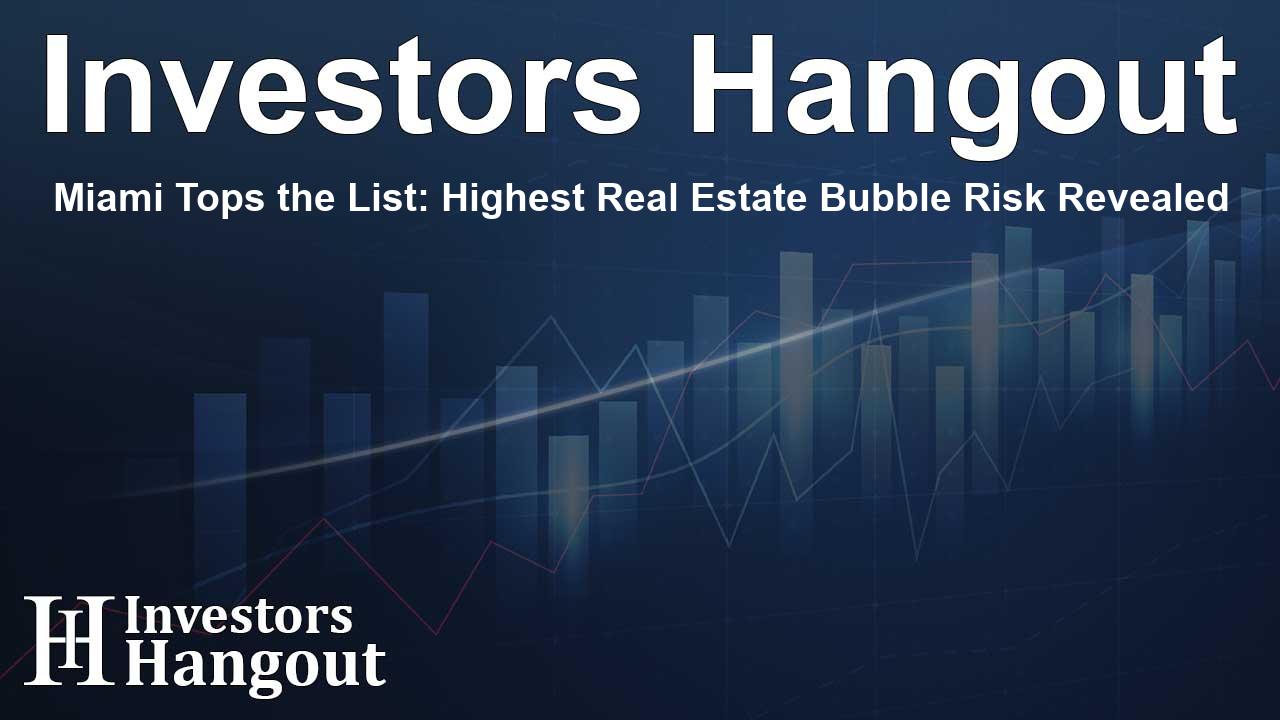Miami Tops the List: Highest Real Estate Bubble Risk Revealed

Miami's Real Estate Bubble Risk
The latest UBS Global Real Estate Bubble Index has pinpointed Miami as the city with the highest risk of a real estate bubble globally. This annual report is crucial for anyone interested in the dynamics of the housing market, as it analyzes the health of various city real estate sectors.
Understanding the Report's Findings
This year, the report indicates a slight decrease in the risk of a housing bubble worldwide, marking the second year in a row of reduced vulnerability overall. This signals a positive note for many investors; however, a deeper dive reveals mixed signals for the U.S. market. While cities in Europe and Asia-Pacific have stabilized, the rising bubble risks in the United States point to a concerning trend.
Other Cities Facing Risks
Besides Miami, a few other cities are battling high bubble risks. Tokyo and Zurich are also notable mentions, although Zurich's bubble risk score has seen a significant decline compared to preceding years. Cities like Los Angeles, Toronto, and Geneva have been identified as having elevated risks, reinforcing the notion that not all international real estate markets are equally secure.
The Surge in Dubai
Dubai's market has made headlines with the most striking increase in bubble risk among the surveyed cities. This growth illustrates the vibrant, yet potentially precarious, nature of its real estate sector.
Stable Markets in the U.S.
Interestingly, cities such as San Francisco and New York are reported to have a low risk of experiencing any real estate bubbles. This is a welcome finding for potential homebuyers and investors in these locations. On the European front, cities like London, Paris, Stockholm, and Milan have also entered a low-risk category as their index scores have continued to decline.
The Impact of Inflation and Interest Rates
Inflation-adjusted housing prices across the analyzed metropolises have averaged 15% lower than the figures noted in mid-2022. This reduction is primarily attributed to the rising global interest rates, affecting the demand and affordability within the market. As such, numerous cities, including Frankfurt, Munich, and Stockholm, have seen real prices drop by over 20%.
Contrasting Trends in Global Markets
While certain markets like Dubai and Miami continue to flourish, significant price corrections have been observed in other major cities like Paris and Hong Kong. Conversely, cities such as Vancouver, Sydney, and Madrid experienced real price increases surpassing 5% compared to the previous year, indicating that the global real estate landscape is anything but uniform.
Conclusion
As investors and homeowners navigate through these turbulent waters, understanding the trends presented in the UBS Global Real Estate Bubble Index becomes paramount. Miami's position at the top emphasizes the need for careful observation and analysis of local market conditions. The insights gleaned from this report can serve as a guiding light for those looking to make informed decisions about their property investments.
Frequently Asked Questions
What city currently has the highest real estate bubble risk?
According to the UBS Global Real Estate Bubble Index, Miami ranks as the city with the highest bubble risk globally.
How does the UBS report analyze housing markets?
The UBS report tracks potential vulnerabilities in real estate markets and assesses the risk of price corrections in various global cities.
Which other cities are indicated to have high bubble risks?
Tokyo and Zurich are also highlighted for their elevated bubble risks, alongside cities like Los Angeles and Toronto.
What trends do inflation and interest rates create in the property market?
Rising interest rates and inflation have generally led to reduced housing prices, with some cities experiencing a decline of over 20%.
What are some cities showing significant price increases in real estate?
Cities like Vancouver, Sydney, and Madrid have seen real estate price increases of more than 5% compared to last year.
About Investors Hangout
Investors Hangout is a leading online stock forum for financial discussion and learning, offering a wide range of free tools and resources. It draws in traders of all levels, who exchange market knowledge, investigate trading tactics, and keep an eye on industry developments in real time. Featuring financial articles, stock message boards, quotes, charts, company profiles, and live news updates. Through cooperative learning and a wealth of informational resources, it helps users from novices creating their first portfolios to experts honing their techniques. Join Investors Hangout today: https://investorshangout.com/
Disclaimer: The content of this article is solely for general informational purposes only; it does not represent legal, financial, or investment advice. Investors Hangout does not offer financial advice; the author is not a licensed financial advisor. Consult a qualified advisor before making any financial or investment decisions based on this article. The author's interpretation of publicly available data shapes the opinions presented here; as a result, they should not be taken as advice to purchase, sell, or hold any securities mentioned or any other investments. The author does not guarantee the accuracy, completeness, or timeliness of any material, providing it "as is." Information and market conditions may change; past performance is not indicative of future outcomes. If any of the material offered here is inaccurate, please contact us for corrections.